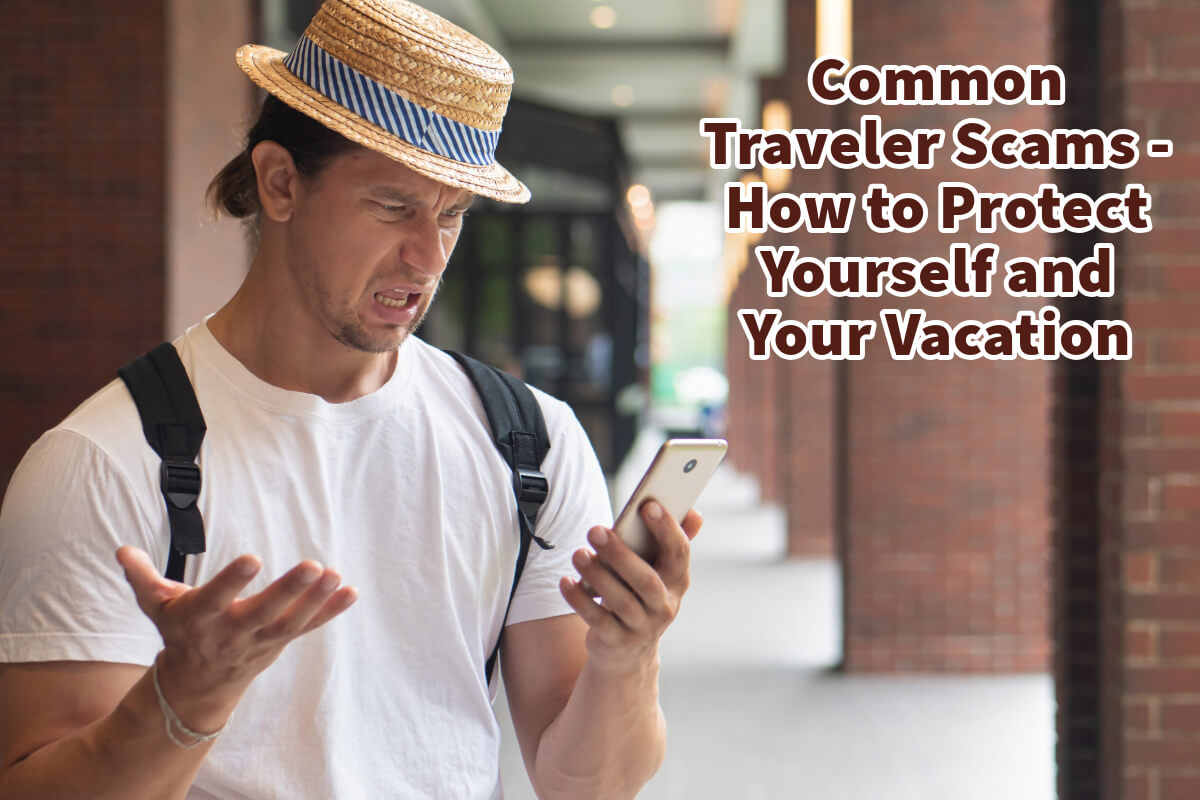Planning a vacation to a new location can be both exciting and daunting. The anxiety of navigating unknown territories often tempers the thrill of exploring unfamiliar places and experiencing new cultures.
One of the most significant concerns for travelers is the risk of being scammed. From misleading hotel advertisements to sophisticated pickpocketing techniques, scams can turn a dream vacation into a nightmare. This comprehensive guide will discuss common traveler scams and provide practical tips on protecting yourself and ensuring your vacation is enjoyable and stress-free.
Table of Contents
My Own Experience with a Hotel in India
Many years ago, I traveled to India during peak tourist season. Most hotels were fully booked, so I asked my travel agent in Hong Kong to find me a five-star hotel in New Delhi. She recommended a purportedly five-star hotel with photos that made it look quite impressive.
I arrived at the hotel late at night, only to discover it was far from five-star quality. At best, it was a two or three-star establishment.
The photos had been misleading, and the hotel had falsely upgraded its rating. The room was in poor condition, with a bare mattress lacking a mattress pad, unwashed blankets, and mothballs in the sinks to mask unpleasant odors. None of these issues were mentioned in the reviews I had seen.
I had a similar experience in Vietnam. In Da Nang, I booked a hotel based on glowing reviews and attractive photos. However, upon arrival, the reality was starkly different.
The following day, I saw the hotel clerk, who might have been the owner, writing his positive reviews.
11 Tips to Help You Avoid Scams When Planning a Vacation
These experiences highlight that even seasoned travelers can fall victim to scams. Here are some strategies to help you avoid such pitfalls when planning your vacation.
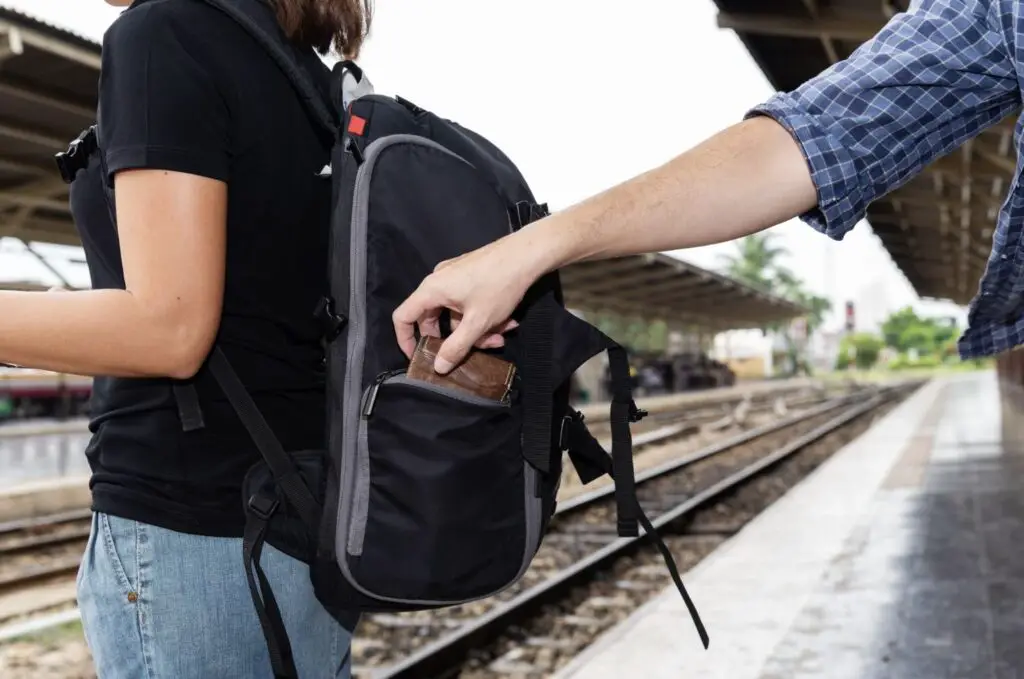
- Check Multiple Independent Websites – There’s an old saying: “You can fool some of the people some of the time, but not all of the people all the time.” To verify a place’s legitimacy, check several independent websites for reviews. It’s challenging for scammers to suppress all negative reviews across multiple platforms. If you notice consistent complaints or red flags, reconsider your choice.
- Call the Property and Ask Questions—If possible, Call the property directly and ask specific questions about its amenities, such as the kind of breakfast it serves or whether it has a business center. For instance, the hotel I stayed at in India pointed me to the manager’s desk as its “business center.” Asking these questions beforehand might have alerted me to the hotel’s shortcomings.
- Check Independent Reviews Online—Popular destinations often have reviews from independent bloggers or travelers. These can provide an unbiased perspective. Look for detailed accounts of other travelers’ experiences to understand better what to expect.
- Use Reverse Image Search – To verify the authenticity of a hotel’s photos, use a reverse image search. This can help you see if the photos have been taken from other websites or if they’re stock images. Authentic photos are more likely to depict the actual state of the hotel.
- Beware of Unrealistic Offers—It probably is if a deal sounds too good. Meager prices or extravagant promises often indicate a scam. Trust your instincts and avoid offers that seem suspiciously attractive.
- Use Secure Payment Methods—When booking accommodations or activities, use secure payment methods like credit cards or reputable payment services like PayPal. These methods offer better protection and help you recover your money if something goes wrong.
- Look for Verified Listings – Many travel websites, such as Airbnb or Booking.com, offer verified listings. The platform has vetted these properties, providing an extra layer of security. Always look for verification badges or endorsements from the website.
- Check the Cancellation Policy – Carefully review the property’s cancellation policy before booking. A flexible cancellation policy indicates that the property is confident in its service and is less likely to be a scam. It also gives you peace of mind in case your plans change.
- Contact Previous Guests – Some platforms allow you to contact previous guests. Reach out to them for firsthand accounts of their experiences. Honest feedback from past guests can provide valuable insights into the property’s actual condition.
- Trust Reputable Travel Agents – If you’re unsure about a booking, consider using a reputable travel agent. Experienced agents often have relationships with reliable hotels and can help you avoid scams. They can also assist if any issues arise during your stay.
- Stay With A Brand You Know—I often stay at Marriott hotels because I know the brand and because if I have a complaint, I can talk to the Marriott corporation.
Additional Tips for Protecting Yourself While Traveling
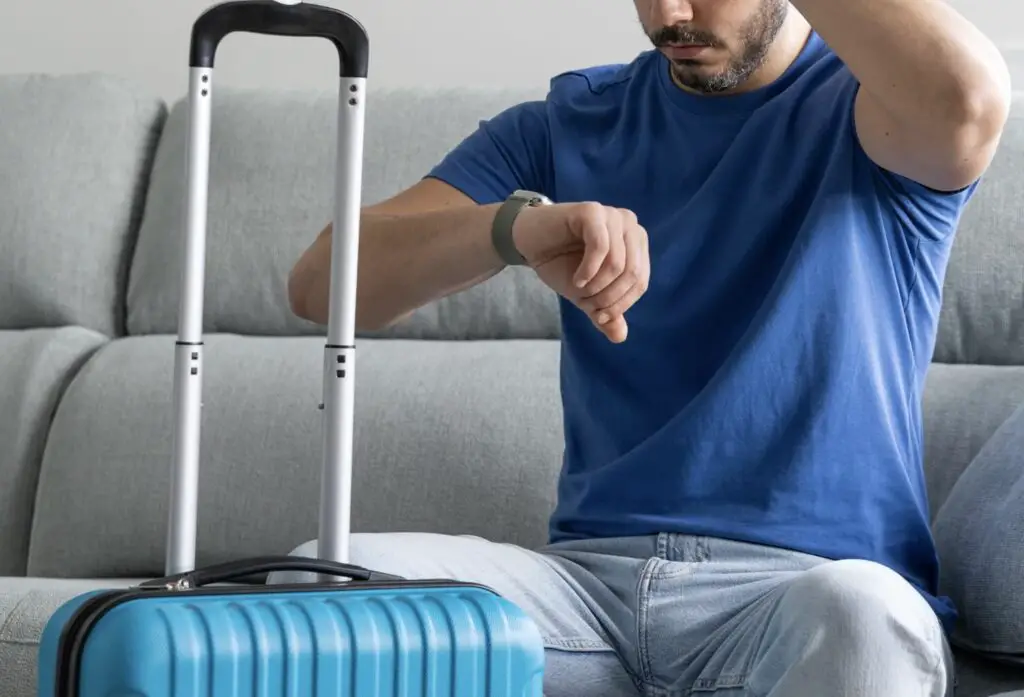
Scams aren’t limited to accommodation; they can occur throughout your trip. Here are some additional tips to protect yourself while on vacation:
- Be Cautious with Public Wi-Fi Public Wi-Fi networks are convenient but can be a hotbed for hackers. Avoid accessing sensitive information on public networks like bank accounts or personal emails. Use a virtual private network (VPN) for added security. I always use a Private VPN when traveling.
- Secure Your Belongings Pickpocketing is a common scam in crowded tourist areas. Use anti-theft bags and keep your valuables close to your body. Be especially vigilant in busy places like markets and public transportation.
- Avoid Sharing Personal Information Be cautious about sharing personal information with strangers. Scammers often pose as friendly locals or fellow travelers to gain your trust and access your details. Always protect your identity.
- Use Licensed Services Whether hiring a taxi, booking a tour, or exchanging currency, use licensed services. Unlicensed providers might offer lower prices but often have higher risks. Look for official certifications or use recommendations from trusted sources.
- Stay Informed About Local Scams Before traveling, research common scams in your destination. Knowing what to expect can help you stay alert and recognize potential threats. Websites like the U.S. Department of State or local tourism boards often provide valuable information on common scams.
- Keep Copies of Important Documents Make copies of essential documents, such as your passport, driver’s license, and travel insurance. Store digital copies in a secure cloud service and keep physical copies separate from the originals. This precaution can help you recover quickly if your documents are lost or stolen.
- Monitor Your Accounts Regularly check your bank and credit card accounts for unauthorized transactions. Promptly report any suspicious activity to your financial institution. Early detection can prevent significant financial losses.
- Learn Basic Local Phrases Knowing a few basic phrases in the local language can help you better navigate and understand your surroundings. It can also deter scammers who might see you as an easy target due to a language barrier.
- Use Travel Insurance Travel insurance can protect you from various unforeseen events, including scams. Ensure your policy covers fraud and theft, providing peace of mind during travels.
- Trust Your Instincts Finally, always trust your instincts. If something feels off or too good to be true, it’s better to err on caution. Your intuition is a powerful tool in protecting yourself from scams.
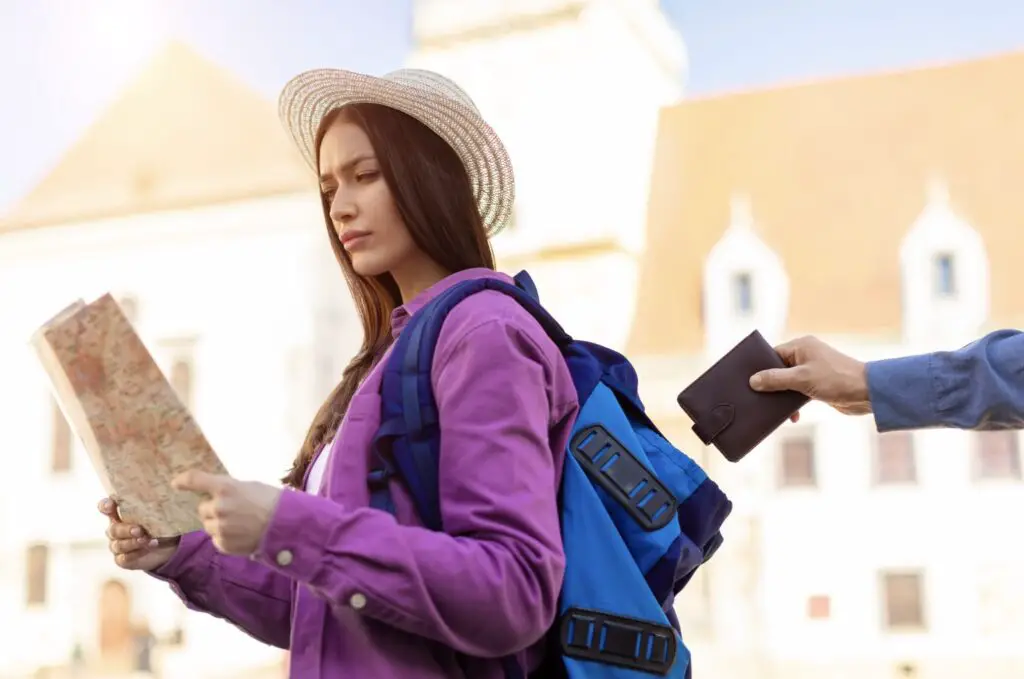
Traveling is an enriching experience that broadens our horizons and exposes us to diverse cultures and environments. However, travelers must be prepared for the risk of scams.
By staying informed and vigilant, you can protect yourself from common traveler scams and enjoy a safe, memorable vacation. Remember to check multiple sources, verify information, and use secure payment methods to safeguard your trip. With these strategies, you can focus on making the most of your travel adventures.
Listen To Our Podcast About
Are You Prepared to Avoid Common Traveler Scams? Below or By clicking here.
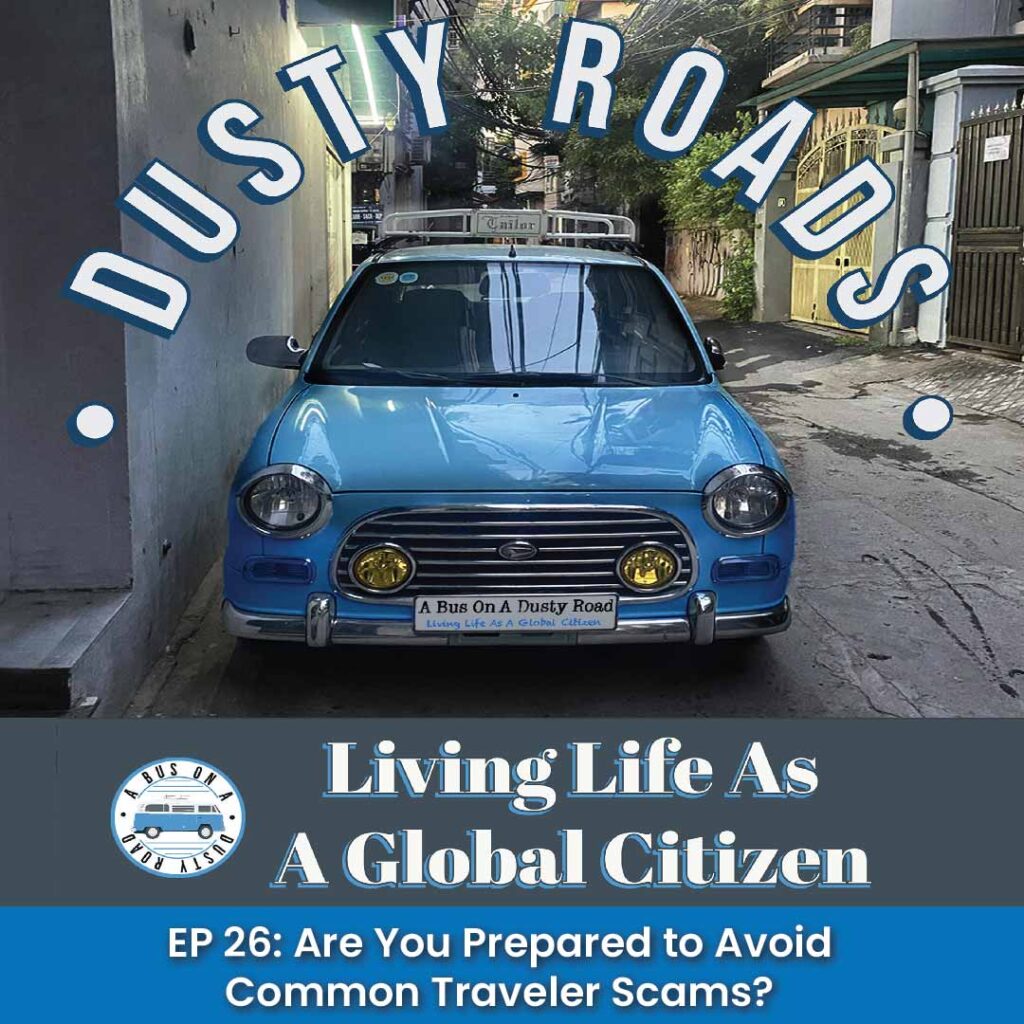
At A Bus On A Dusty Road, we talk about everything about travel, life, and ex-pat living. We are all about “Living Life As A Global Citizen.” We explore social, cultural, and economic issues and travel.
We would love to have you be part of our community. Sign up for our newsletter to keep up-to-date by clicking here. If you have any questions, you can contact me, Anita, by clicking here.
Listen to our Podcast called Dusty Roads. You can find it on all major podcast platforms. Try out listening to one of our podcasts by clicking here.
Subscribe to our A Bus On A Dusty Road YouTube Channel filled with great videos and information by clicking here.
Related Questions
Is The Conqueror Virtual Challenge Legit? 10 Things to Know And Understand
The Conquer Virtual Challenge is 100% legit. Upon completing a challenge, you will receive a medal for acknowledging that you have completed the challenge. You can also pay extra to get a T-shirt or purchase merchandise. Even though this challenge is 100% virtual, it is an excellent way to virtually experience different parts of the world.
By clicking here, you can discover Is The Conqueror Virtual Challenge Legit? 10 Things to Know And Understand.
What Is A Virtual Challenge?
A virtual challenge you do virtually by posting your mileage into an app or on your computer. You can run, walk, swim, cycle, step, or exercise at your own pace as you move along a specified route on a map. You can do it individually, as a team, or as a community.
You can learn more by reading What Is A Virtual Challenge? 11 Facts About Virtual Fitness Challenges by clicking here.
My Experience With The Conquer Virtual Challenge
The Conquer Virtual Challenge as a great way to virtually see the world while allowing every mile I do to count towards something. You can see on Google Earth where you are traveling in various parts of the world and what the surrounding area of where you are virtually traveling looks like.
You can learn more by reading My Experience With The Conquer Virtual Challenge by clicking here.

